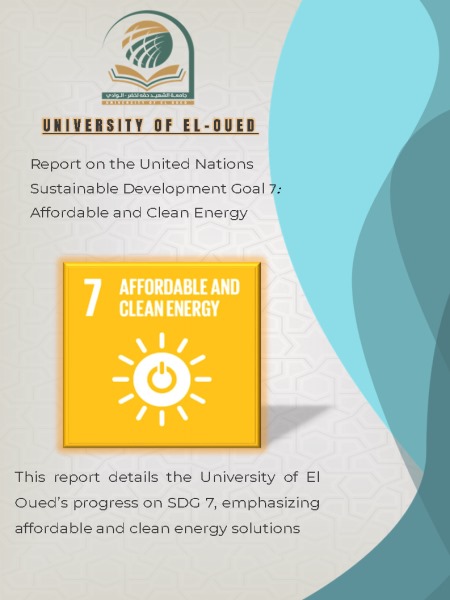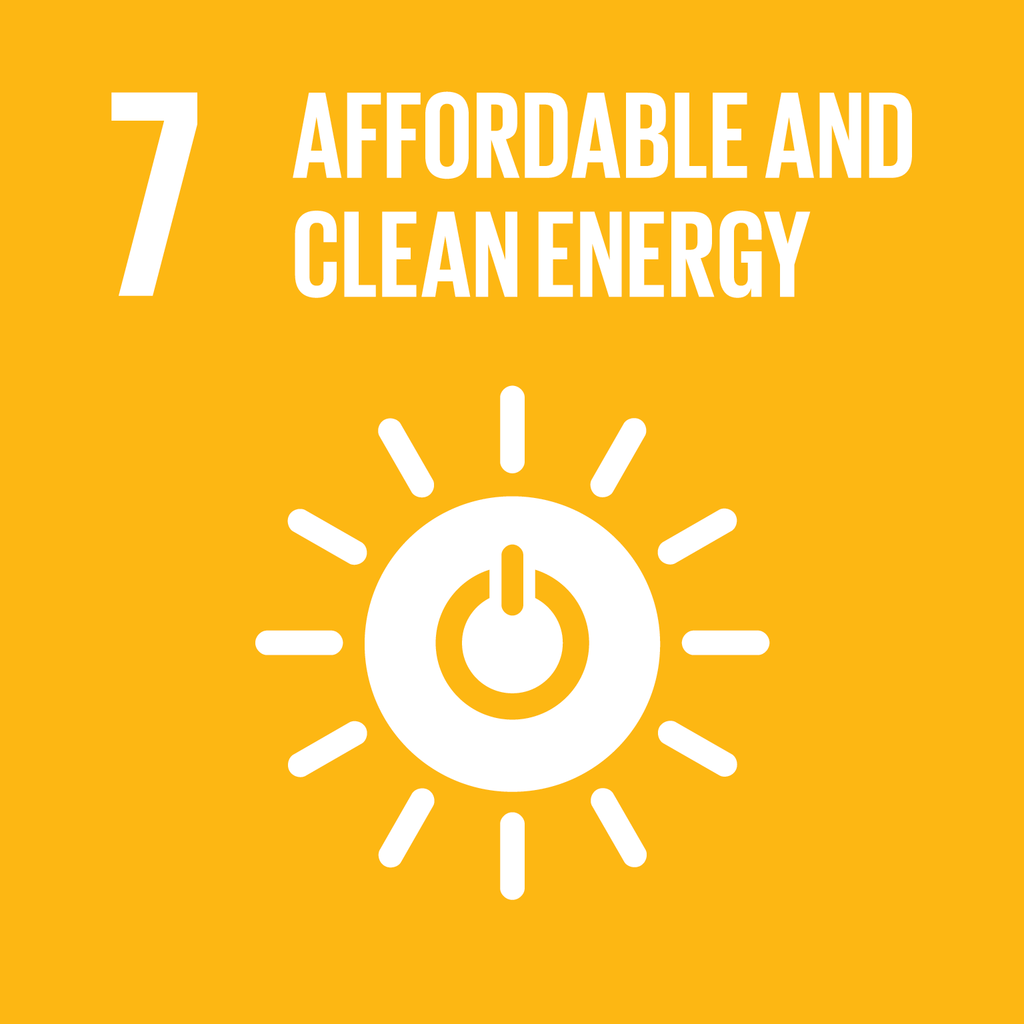
Introduction
Sustainable Development Goal 7 (SDG 7) emphasizes the importance of universal access to affordable, reliable, and modern energy, with a strong focus on clean and renewable energy sources. The University of El Oued is committed to advancing this goal through a combination of innovative policies, sustainable infrastructure projects, and community outreach initiatives. This report details the university’s comprehensive efforts to promote affordable and clean energy, supporting the transition to a sustainable energy future.
University Measures for Affordable and Clean Energy
The University of El Oued has implemented a range of policies and initiatives designed to enhance energy efficiency and promote the use of clean energy on campus.
- Energy Efficiency Standards for New Buildings
The university ensures that all new buildings are designed and constructed according to strict energy efficiency standards. These standards, updated most recently in 2022, require buildings to incorporate sustainable architecture and energy-saving technologies, such as advanced insulation materials, low-energy lighting, and the integration of renewable energy sources where possible. This policy aligns with the university’s commitment to reducing its carbon footprint and serves as a model for sustainable construction practices in the region.
- Upgrading Existing Buildings
A campus-wide plan is in place to upgrade existing buildings, focusing on enhancing energy efficiency and reducing operational costs. The upgrade process includes replacing outdated lighting systems with energy-efficient LED alternatives, installing smart thermostats, and enhancing insulation to reduce heating and cooling demands. These upgrades significantly reduce energy waste and create a more sustainable campus environment.
- Renewable Energy Integration
The University of El Oued has incorporated renewable energy sources, including solar panels, in several campus buildings. The adoption of solar energy helps offset campus electricity consumption, reducing reliance on conventional, non-renewable power sources. Solar energy provides a reliable and clean source of electricity for key facilities, supporting a greener energy profile for the university.
- Energy Efficiency and Carbon Management Plan
The university has developed a comprehensive Energy Efficiency and Carbon Management Plan that outlines specific targets for reducing energy consumption and managing emissions. This plan includes:
- Regular energy audits to identify areas of improvement in energy use.
- Carbon reduction goals that prioritise a transition to low-emission energy sources.
- Utilisation of renewable resources, especially solar power, to reduce reliance on fossil fuels and minimise greenhouse gas emissions.
Through this plan, the university is steadily progressing toward a carbon-neutral campus, demonstrating its commitment to environmental responsibility.
- Energy Reviews and Monitoring
The university conducts periodic energy reviews to assess consumption patterns and identify areas with the highest energy waste. These reviews are instrumental in refining energy policies and implementing changes to enhance energy efficiency across campus facilities. This systematic approach ensures that energy-saving measures are data-driven and continuously optimized.
Research and Innovation in Renewable Energy
The University of El Oued is also a leader in renewable energy research, particularly in solar technology. Professor Attia Mohammed El Hadi, a distinguished faculty member and recognized expert in renewable energy, has made notable contributions through his innovative research projects, including: Conical Solar Distillation System, Hybrid Photovoltaic-Thermal (PVT) Solar Collector and Thermal Analysis of Finned Hybrid Bi-Fluid PVT System.
These research projects, alongside Professor Attia’s contributions, reinforce the university’s status as a leader in renewable energy innovation and support the development of sustainable energy solutions for Algeria and beyond.
Energy and Community Engagement
The University of El Oued is committed to extending its energy initiatives beyond campus, actively engaging the local community and supporting sustainable practices through educational and outreach programs.
- Community Programs on Energy Efficiency
The university regularly hosts workshops, seminars, and training sessions that educate the community on the benefits of energy efficiency and renewable energy. These programmes are tailored for local residents, students, and industry professionals, raising awareness on how to implement energy-saving practices in everyday life. By fostering a culture of sustainability in the local area, the university contributes to long-term energy conservation.
- Advocating for Renewable Energy Adoption
Through public events and discussions, the university advocates for increased adoption of renewable energy in the region. The institution promotes solar energy and other sustainable alternatives by demonstrating their benefits and feasibility. These advocacy efforts help influence public opinion and encourage local stakeholders to invest in cleaner energy options.
- Support for Local Industry
In collaboration with local industry partners, the university offers support and expertise to enhance energy efficiency and reduce carbon emissions. Training programs conducted by university experts educate local businesses on how to implement sustainable practices, making regional industries more environmentally friendly and competitive.
- Government Collaboration on Clean Energy Initiatives
The university actively collaborates with government agencies to advance clean energy technologies and policies. Research conducted by faculty members, including studies by Professor Attia Mohammed El Hadi and colleagues, informs policymakers on renewable energy advancements, helping to shape policies that support a transition to a low-carbon economy.
- Support for Startups in Renewable Energy
In line with Ministerial Decree 1275, the University of El Oued supports startups focused on renewable energy and low-carbon technologies. Through the university’s entrepreneurship center, these startups receive mentorship, access to research resources, and opportunities to develop sustainable products and services. This support not only fosters innovation but also aligns with Algeria’s goals of expanding its clean energy sector.
Promoting Conscious Energy Usage on Campus and Beyond
The university promotes energy-conscious behaviour among students, faculty, and staff, emphasizing the importance of energy conservation in daily activities.
- Campus Awareness Campaigns
Information on energy conservation is widely shared across campus through posters, digital displays, and workshops. The university organizes energy-saving challenges and events that encourage students to actively participate in reducing energy consumption. These initiatives aim to cultivate an energy-conscious mindset across the university community.
- Outreach in the Wider Community
The university’s outreach programs extend into the broader community, promoting clean energy practices and energy conservation through public seminars and collaborative projects with local schools and organizations. By sharing expertise and raising awareness, the university fosters a culture of sustainability within the community, contributing to the regional transition toward sustainable energy.
Conclusion
The University of El Oued’s commitment to SDG 7 is demonstrated through its energy-efficient policies, renewable energy integration, innovative research, and active community engagement. From sustainable infrastructure upgrades and solar energy adoption to Professor Attia Mohammed El Hadi’s groundbreaking research, the university is making significant strides in promoting affordable and clean energy. Through these combined efforts, the University of El Oued not only supports the development of renewable energy technology but also serves as a role model for sustainability in higher education and the wider community. The institution’s ongoing dedication to SDG 7 contributes to a greener future and a sustainable energy landscape for Algeria and beyond.

